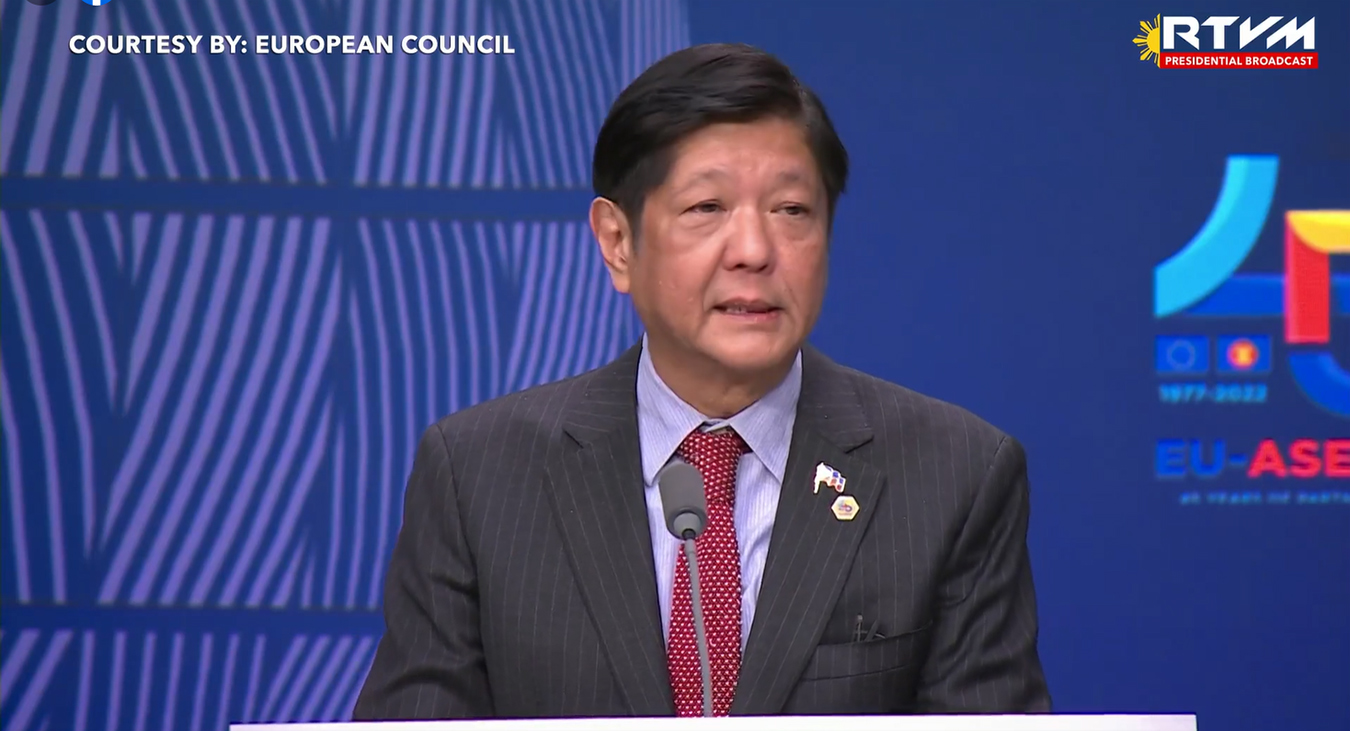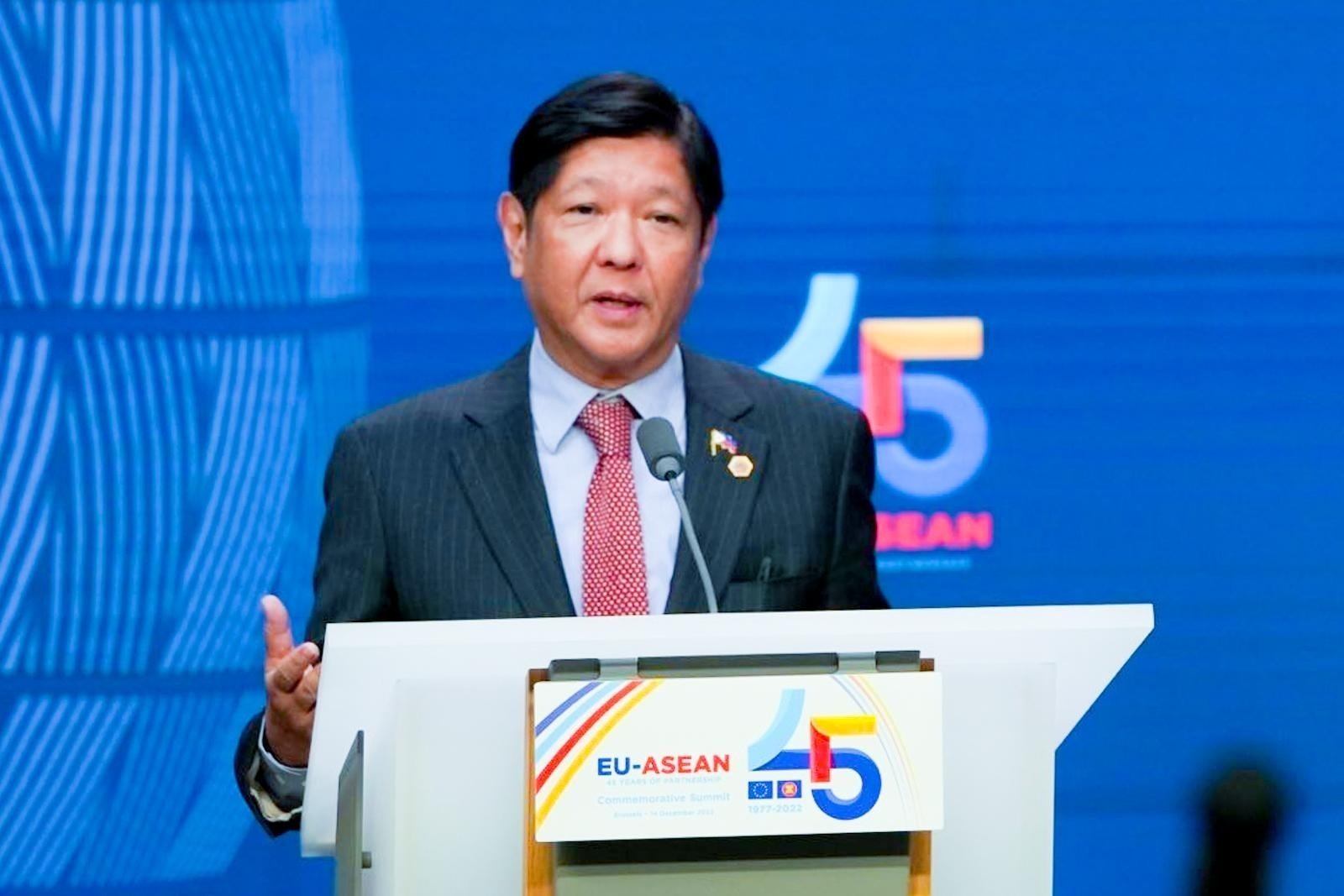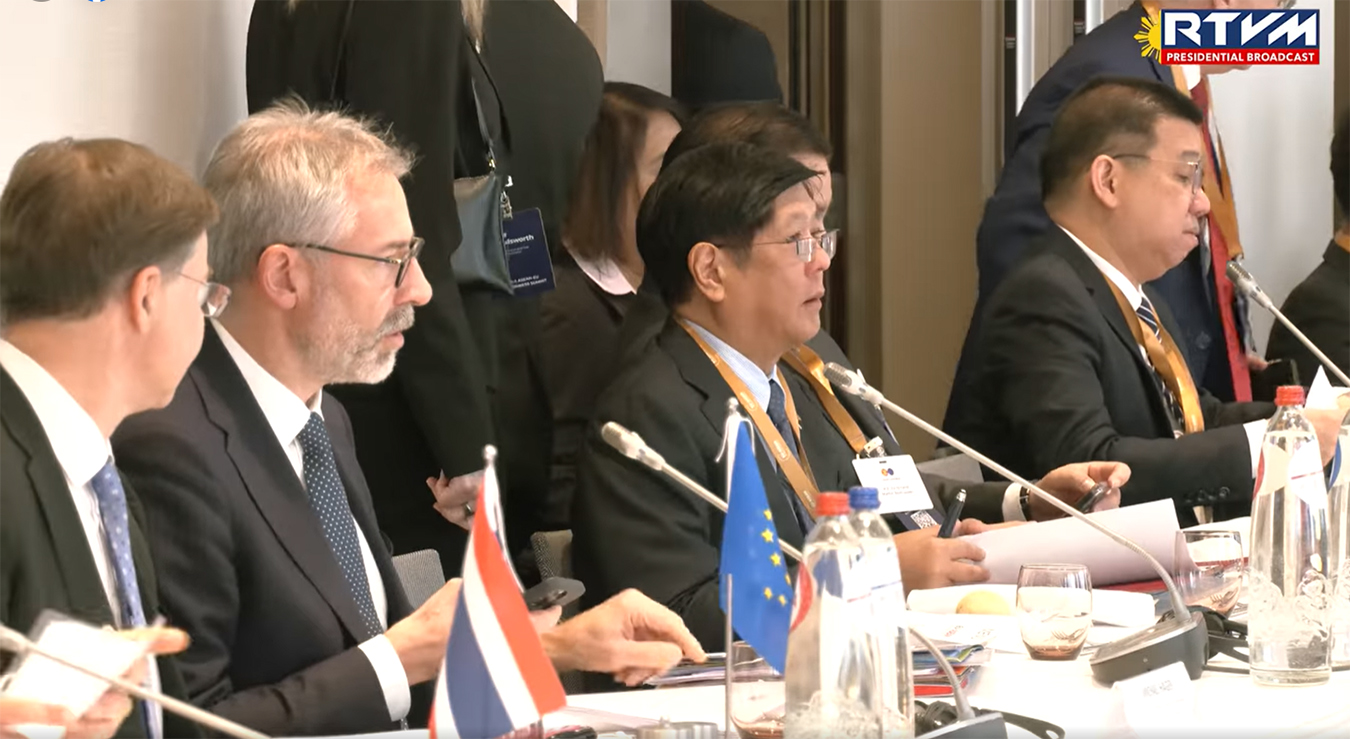Q: Good day. President Marcos, how are you doing?
PRESIDENT MARCOS: Just about managing.
Q: Okay. Thank you very much. President Marcos, you cited in your speech earlier the need to go beyond declaring respect and support for UNCLOS and to see an effective application of the UNCLOS to address maritime disputes. And we all know that these include the South China Sea row. What concrete measures can the ASEAN and the EU undertake to ensure the rule of law in disputed areas, beyond the usual strongly worded statements?
PRESIDENT MARCOS: Well, this is one of the reasons that we have these conferences is to map out any possible actions that might be jointly taken because every action that might be taken that objects or brings a light to a possible violation of the UNCLOS is much stronger when it is brought about by a group of nations such as ASEAN and if the EU now with our strategic partnership is able to also join their voices to that, then that will be much stronger into terms of actually being able to enforce what UNCLOS is all about.
Their commitment, the EU’s commitment which is found in the joint declaration, the EU’s commitment to --- even the doctrine of the DOC, the doctrine of behaviors in the South China Sea is already a very, very big step for us in the Philippines for example and for all the countries around the South China Sea, that we now have the support, a strategic support from not only the member countries of EU but of EU itself.
Now because EU and ASEAN, together comprise the largest, most well-organized regional aggrupation, then that will be a very, very strong --- that will be a very, very strong position to be able to negotiate, even individually for the Philippines or jointly with ASEAN or even with the EU as perhaps as a third party for us to take action and to negotiate further these difficulties that we are all having to face with the problems in terms of territoriality in the South China Sea.
Q: To President Marcos and Prime Minister Hun Sen, the EU has announced this 10 billion euros of infrastructure investments. Now, that is just a drop in the ocean really when you compare it to what the Asian Development Bank estimates is needed in terms of investments to keep up levels of growth in the ASEAN. What would you have like to see? Would you like to see more? Can you give us some insights into that?
PRESIDENT MARCOS: Well, I think the one who can best answer that will be the donor of the 10 billion euro and we would like to ask them how they would want us to use their hard-earned money when it comes to ASEAN. So perhaps President Michel...
---
PRESIDENT MARCOS: If I might just add something, it is remarkable actually to see during our meetings how despite the marked differences between EU Member States and ASEAN Member States that it is remarkable that we identify as the same --- we identify the same priorities as EU together --- as ASEAN does, as the EU seems to also have the same priorities. And those are in the areas that we spoke about, environmental protection, sustainable economic development, combatting climate change, connectivity, cybersecurity, digital transition, migration, gender justice.
So it is, as I said, it is just an indication and a manifestation of how global we have actually become and although we come from very different places, from very different conditions, we have a very similar view, a very similar worldview of the challenges that we all face.
--
Q: A lot of talk about the things that you have in common but just reading the joint statement, there certainly are some differences particularly on Ukraine where it says most members strongly condemn the war in Ukraine and stressed it is causing immense human suffering. To Prime Minister Hun Sen, President Marcos, could you explain why it isn’t all members that are condemning the war in Ukraine? Just a follow-up question, ASEAN is often portrayed as a swing state between the big parts of the United States, China, and Europe. I’m wondering from both of your perspectives whether you welcome the European Union to compete with United States and China or whether indeed you see it in that way? Thank you very much.
PRESIDENT MARCOS: Perhaps, I should answer the second part of your question about the competition between the United States and China and if it’s that what we want. Believe me, we would rather not have these tensions in our part of the world. That is the last thing that we would like. And we --- the Philippines for our part has taken an independent policy and we absolutely refuse to go back to the situation of the Cold War where we have to pick sides in terms of who the superpower is that we are aligned with.
What we say is that --- to put it very simply is that in the Philippines our foreign policy is the policy for peace and for the national interest. So foreign policy will always be guided by a commitment to peace and the pursuit of the national interest.
In terms of that competition, as I said, we have to find, I think all of us Member States especially in ASEAN, have to find our own way. However, I think I would not be overstepping by saying that we agree in the sense that we are committed to the idea that the future of the Asia-Pacific region should be decided by Asia-Pacific countries and not any other power outside of our area.
Q: Good afternoon, Mr. President Marcos. What has been the EU’s response to your call to concretize the loss and damage concept in relation to climate financing and what measures can be done to ensure that major polluters will be made accountable?
PRESIDENT MARCOS: Well, it’s this very tricky question. And I brought it up simply to illustrate that EU has in fact been at the forefront in this kind, in the kind of --- shall we say, compensation for climate change. And however, the issue of damage and loss is still --- although it is a big step forward that we all now accept both developing and developed countries, now accept the concept of damage and loss, the actual number is very, very hard to determine. And beyond that, even if we are able to quantify the damage and loss, it says 100 million dollars whatever the number is, what do we do with that number? Who do we go to? Who do we --- who pays the bulk of it?
However, I sense that there is a willingness for the developed countries to participate and to help in mitigation, to help in adaptation for those countries like the Philippines, most of the countries around ASEAN that are very vulnerable, there’s a willingness to help but how to provide that help is still a question that we cannot definitively answer.
That is why a lot of work has to be done. And I have brought it up with the EU and I’ve said that this is an important issue, especially for the Philippines and for many, many other countries. But again, it’s the work that we have ahead of us to be able to come to some kind of agreement as to what damage and loss actually means.
And what --- how will the compensation for that damage and loss be made. And on my part, I think until we are able to determine that, I think we should think of what we can do in the future, and that I think has great potential to be put into effect in the short term, rather than in the very long term.
--- END ---




